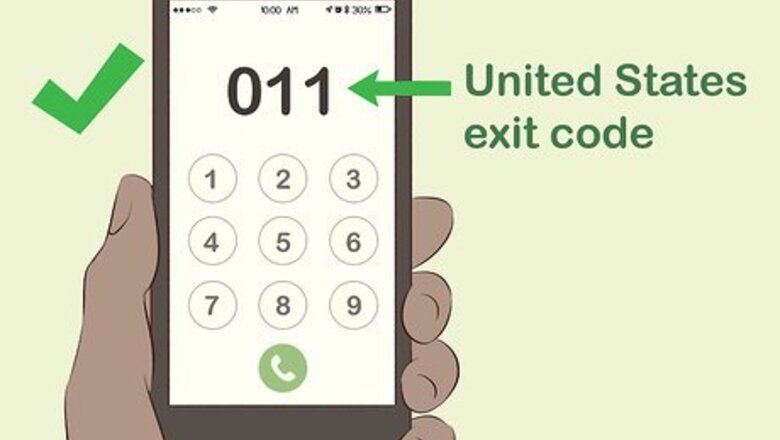
views
Dialing a UAE Number
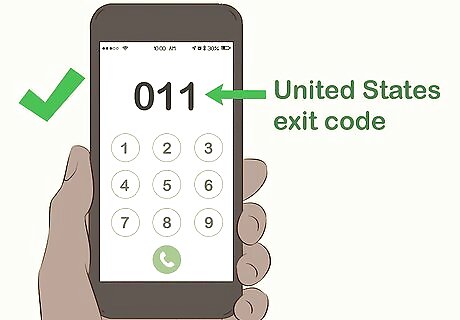
Dial your country’s exit code to route the call internationally. Each country has its own exit code, so the number you need to dial varies slightly depending on where you are in the world. The most common exit codes are 00, used throughout Europe, and 011, used for most of North America. Ask your phone service provider for the access code or look it up at https://www.howtocallabroad.com/codes.html For example, the exit code for Australia is 0011. When you dial the UAE, the phone number looks like 0011+XXX+X+XXX-XXXX. Some countries have multiple exit codes. In Brazil, for example, each phone service provider has its own exit code. If you’re calling from a cell phone, look for a + button on your number pad. Pressing it automatically inputs the exit code. You don’t need to type it in yourself afterward.
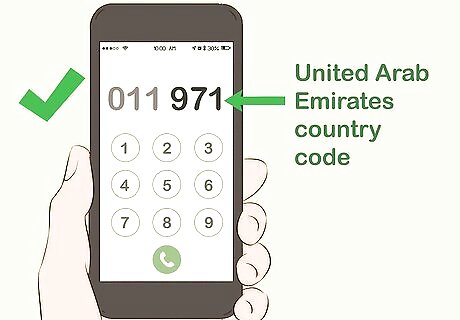
Type in 971 to reach the United Arab Emirates. Every country in the world has a unique country code. You will always reach a UAE number by dialing 971. In addition, the country code always comes after your exit code. Make sure you type the correct country code. If you get the code wrong, you may end up calling someone in a different country! After typing the country code, the number you have dialed may look something like 0011+971+X+XXX-XXXX.
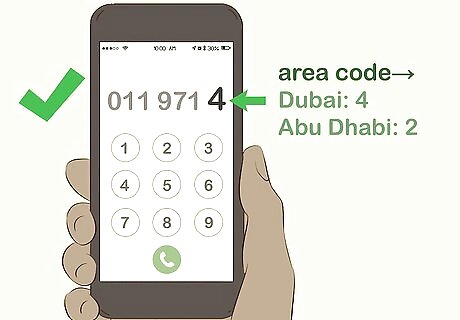
Include the area code for the city you wish to call in the UAE. Like in a lot of countries, the UAE is divided up into service regions. Major UAE cities like Dubai are covered by single-digit area codes. For smaller regions like Tarif, the area code is 2 digits long. Find an area code at https://countrycode.org/uae. For example, the area code for Dubai is 4. Dial 2 to reach Abu Dhabi instead. The area code always comes after the country code, so the number you have dialed will look like 0011+971+4+XXX-XXXX. If you see a phone number that begins with 0, leave off the 0 when dialing it. For example, you may see a Dubai number with a 04 area code. The 0 is for domestic calls, so dial it only when you're calling from within the UAE.
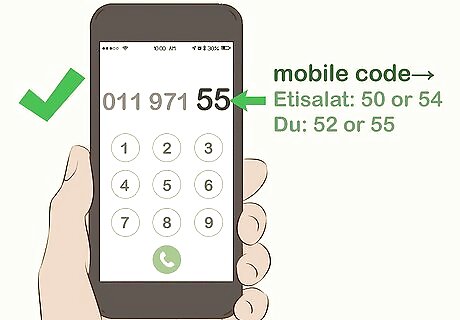
Use an area code starting with 5 if you’re calling a mobile number. Mobile numbers have a separate area code no matter where you’re calling. The code you need depends on what service provider the other person has. The only way to figure out someone’s mobile phone number is by asking them or figuring out which service provider they use. Mobile codes are always 2 digits long. For example, numbers covered by Etisalat use 50 or 54. Numbers covered by Du often begin with 52 or 55. If you’re calling a mobile number, dial something like 0011+971+55+XXX-XXXX. Like with landlines, avoid dialing 0 if a phone number starts with it. You only need to dial it when you’re calling domestically.
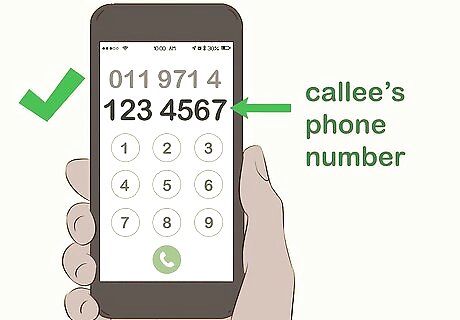
Type in the phone number to complete the call. Phone numbers in the UAE are 7 digits long, excluding the area code. To complete the call, you will need to ask for that phone number or find it online. The finished phone number will look something like 0011+971+4+XXX-XXX. This number places a call to Dubai from Australia.
Managing Fees While Calling

Contact your phone carrier to get a calling plan if you make lots of calls. Notify your phone service provider that you plan on calling the UAE. Ask them about the costs and what plans they have available. Many carriers have monthly plans catering to international callers. If you think you’ll need to make lots of calls, such as when contacting family in the UAE, a prepaid plan can save you a lot of money. Note any fees the phone carrier includes in their terms of service. Calling abroad is often costly, so explore your options before settling on a carrier.
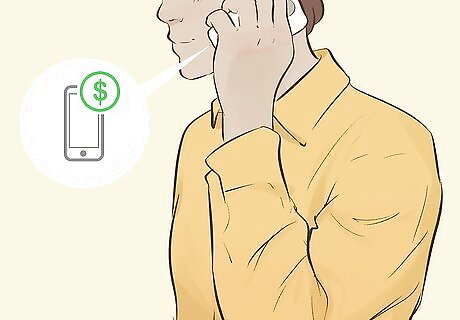
Get a prepaid calling plan if you make few calls. A lot of the major phone carriers offer pay as you go plans. You decide in advance how many minutes you wish to buy. When your minutes are up, you can no longer make calls until you buy more data. Prepaid plans are a great way to place international calls without paying for a monthly plan. Your phone calls are limited to what you pay for, so you do need to manage time wisely. However, using limited data prevents you from overspending on long calls.
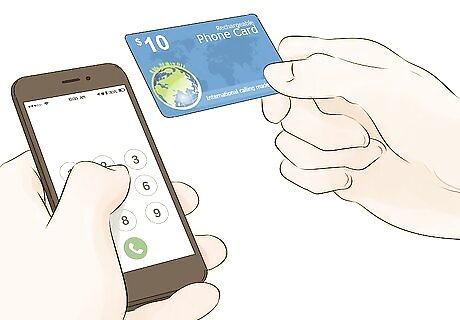
Buy calling cards for reduced rates if you make short calls. Order an international calling card online or buy one from a telephone service provider. Read the front of the card to find out how many minutes it contains and what rate it charges. Make sure the card is valid for calls to the United Arab Emirates. When you use the card, dial the number on it before dialing your country’s exit code. Depending on where you live, you may be able to find cards available at supermarkets, convenience stores, and other locations. If you visit the UAE, the country’s telecom companies sell prepaid cards that stay valid even while you’re abroad. Read the fine print on the cards carefully to find out what fees come along with placing calls.
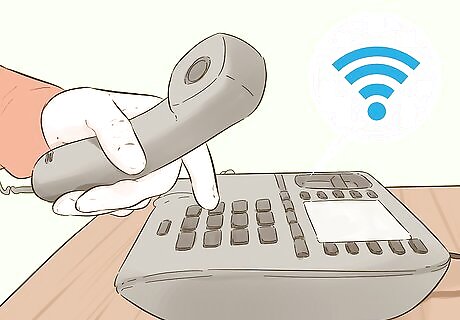
Purchase a Voice over Internet Protocol (VoIP) phone for frequent calls. Find a service provider that sells VoIP phone plans, such as Vonage. Phones equipped with VoIP technology place calls over the Internet instead of traditional phone lines. As a result, you can place international calls at a reduced rate. If you call the UAE several times a month, VoIP technology is a good investment. Some companies sell phone adapters that allow you to place VoIP calls on your regular phone. Use the adapter to place calls through your computer or landline. The disadvantage of VoIP phones is that you need a stable Internet connection. Using a high-speed connection increases the quality of your calls.
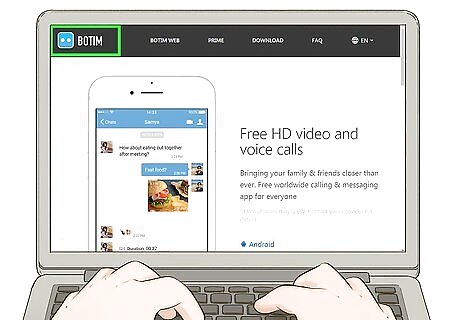
Use a legal Internet app if you wish to make quality video calls. In the UAE, the government sets regulations on what apps its citizens can use for phone calls. Voice over Internet protocol (VoIP) apps are common across the world, and the ones used in the UAE are called BOTIM and C’me. To use these apps, you need to either be connected to Wi-Fi or use your phone’s mobile network. The person you are calling also needs to have the app installed on their device. Botim and C’me charge a monthly fee to access the app, which can get costly for most residents. On the plus side, these apps offer both regular and video calls. As of 2018, apps like Skype and FaceTime are banned in the UAE. This may change in the near future, but for now, the UAE government wants to steer its citizens away from free services.




















Comments
0 comment